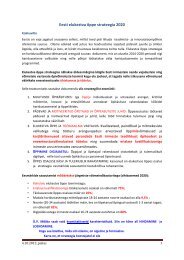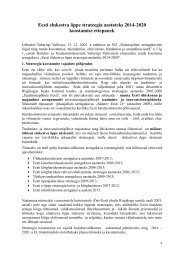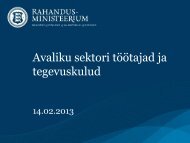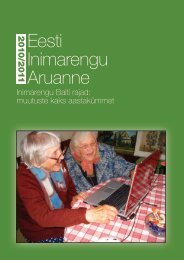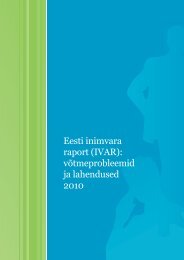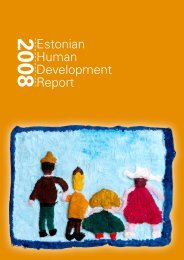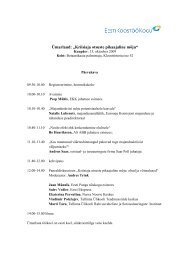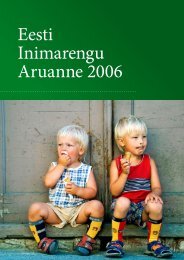DEVELOPMENT
The pdf-version - Eesti Koostöö Kogu
The pdf-version - Eesti Koostöö Kogu
You also want an ePaper? Increase the reach of your titles
YUMPU automatically turns print PDFs into web optimized ePapers that Google loves.
5.2<br />
The impacts of globalisation and possible<br />
strategies in a globalising world<br />
Silja Lassur, Erik Terk<br />
In order to ascertain the attitude of the different elite groups<br />
of Estonia about globalisation, the Turu-uuringute AS conducted<br />
an expert survey in early 2013, which included 177<br />
experts – 43 politicians, 55 people active in the economic<br />
field and 35 in the cultural field, as well as 44 scholars who<br />
have defended their doctoral theses during the last three<br />
years. The politicians’ sample included both opposition as<br />
well as coalition members from the Riigikogu and representatives<br />
of bigger municipalities, as well as people working<br />
for the larger political parties. The group of economic decision-makers<br />
included 42 economic policymakers (the Ministries<br />
of Economic Affairs and Finance, the Bank of Estonia<br />
and the Estonian Development Fund, members of the Riigikogu’s<br />
committees on economics and finance, leaders of the<br />
national business associations, and economists who have<br />
actually participated in economic policymaking) as well as<br />
13 representatives of companies and commercial banks,<br />
who have been active in the sectoral business associations,<br />
or who have spoken out about Estonia’s economic situation<br />
and economic policy. For brevity, the latter are referred to,<br />
hereinafter, as entrepreneurs. The sample of cultural figures<br />
also encompassed those, including journalists, who have<br />
participated in public discussions on the Estonian culture<br />
and issues related to Estonia’s general development. Since<br />
the sample included people who are in important positions<br />
and actively participate in making key decisions related to<br />
Estonia’s politics, economy and cultural life, this survey can<br />
be described hereinafter as an “elite survey”.<br />
5.2.1<br />
How are the results of globalisation<br />
being perceived?<br />
The survey shows that the assessments of the results of<br />
globalisation in Estonia are relatively positive, especially<br />
considering the impact of the international economic<br />
recession that hit Estonia recently. On a scale of one to<br />
five, 85% of the entrepreneurs, 88% of the economic<br />
policymakers, 65% of the politicians, 69% of the cultural<br />
figures and 73% of the newly graduated PhDs chose the<br />
option “globalisation has predominantly provided development<br />
opportunities” or “has provided more opportunities<br />
than risks for development.”<br />
In order to ascertain in detail which consequences the<br />
respondents were more satisfied with, and which less, they<br />
were given a list of nine potential results of globalisation,<br />
and were asked to assess them separately (see Table 5.2.1).<br />
We see that, as a rule, the most positive assessments<br />
were given by the representatives of the economic elite.<br />
The fact that the economic circles strongly support globalisation<br />
is not surprising. It was not the first time – a<br />
Table 5.2.1<br />
Assessments of the potential impacts of opening up<br />
Estonia to the world<br />
Improvement of export<br />
opportunities for Estonian<br />
companies<br />
Increased diversity of lifestyles<br />
and areas of activity<br />
Inflowing foreign investments<br />
for Estonian companies<br />
Access to international<br />
financial capital<br />
Opportunity for Estonians to<br />
work abroad<br />
Increasing movement of<br />
people across state borders<br />
Increased competition in<br />
various spheres of life<br />
Opening of Estonia to foreign<br />
labour<br />
International crime related to<br />
globalisation<br />
survey conducted among Estonian economic policymakers<br />
in 2000 showed that over 90% of them were positive<br />
about globalisation. It was less obvious that the politicians<br />
that had unanimously conducted pro-globalisation policies<br />
over a long period of time, and in various governments,<br />
were more critical about some social results of globalisation<br />
than the respondents from the cultural sphere. The<br />
entrepreneurs are not as unanimously positive about the<br />
increase of competition and about Estonia opening up to<br />
foreign labour as are the economic policymakers. It should<br />
be remembered that in the assessment of some influences<br />
different respondents may base their assessments on dif-<br />
Entrepreneurs<br />
Economic policymakers<br />
Politicians<br />
Cultural figures<br />
PhDs<br />
Ranking of the sample<br />
as a whole<br />
4.9 4.8 4.6 4.3 4.3 1<br />
4.6 4.4 3.9 4.3 4.1 2<br />
4.6 4.4 4.2 4.1 4.0 3<br />
4.6 4.1 3.9 3.9 4.0 4<br />
4.2 4.1 3.7 4.1 3.9 5<br />
4.2 3.9 3.7 4.0 3.6 6<br />
3.8 4.1 3.5 3.9 3.6 7<br />
3.2 3.6 3.4 3.5 3.4 8<br />
2.6 2.6 2.7 2.5 2.7 9<br />
Average value on a scale, where 1 = impact has been very negative;<br />
5 = impact has been very positive<br />
For the last option in the table (international crime related<br />
to globalisation) it is difficult to expect the answer to be “the<br />
impact is positive”. However, almost 60% of the respondents<br />
found that this impact is difficult to assess, and 31% felt that<br />
the impact of globalisation is negative.<br />
Estonian Human Development Report 2012/2013<br />
197



